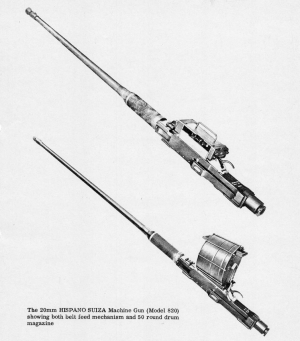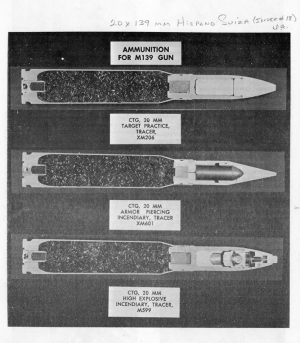Difference between revisions of "Oerlikon KAD (20 mm)"
Colok76286 (talk | contribs) (Edits) |
(→History) (Tag: Visual edit) |
||
| Line 21: | Line 21: | ||
There are two shell types across three belts. | There are two shell types across three belts. | ||
| + | |||
* Default- API-T/HEF-I (Armour-Piercing Incendiary- Tracer/High Explosive Fragmentation-Incendiary ) | * Default- API-T/HEF-I (Armour-Piercing Incendiary- Tracer/High Explosive Fragmentation-Incendiary ) | ||
* M594- HEF-I/HEF-I/API-T (Anti-Air) | * M594- HEF-I/HEF-I/API-T (Anti-Air) | ||
| Line 26: | Line 27: | ||
The M594 and M601 shells are American shells. | The M594 and M601 shells are American shells. | ||
| + | |||
* M601- API-T round, up to 53 mm of penetration at point-blank range, good for attacking light vehicles and some tanks if only from the sides and back. Has a tungsten-carbide penetrator and a .75g XM71 incendiary pellet inside. | * M601- API-T round, up to 53 mm of penetration at point-blank range, good for attacking light vehicles and some tanks if only from the sides and back. Has a tungsten-carbide penetrator and a .75g XM71 incendiary pellet inside. | ||
* M594- HEF-I Good for anti-aircraft use. Has M955 self-destroying fuse, tracer base and 120 grams of explosive filler. | * M594- HEF-I Good for anti-aircraft use. Has M955 self-destroying fuse, tracer base and 120 grams of explosive filler. | ||
| Line 54: | Line 56: | ||
<!-- ''Examine the history of the creation and combat usage of the weapon in more detail than in the introduction. If the historical reference turns out to be too long, take it to a separate article, taking a link to the article about the weapon and adding a block "/ History" (example: <nowiki>https://wiki.warthunder.com/(Weapon-name)/History</nowiki>) and add a link to it here using the <code>main</code> template. Be sure to reference text and sources by using <code><nowiki><ref></ref></nowiki></code>, as well as adding them at the end of the article with <code><nowiki><references /></nowiki></code>.'' --> | <!-- ''Examine the history of the creation and combat usage of the weapon in more detail than in the introduction. If the historical reference turns out to be too long, take it to a separate article, taking a link to the article about the weapon and adding a block "/ History" (example: <nowiki>https://wiki.warthunder.com/(Weapon-name)/History</nowiki>) and add a link to it here using the <code>main</code> template. Be sure to reference text and sources by using <code><nowiki><ref></ref></nowiki></code>, as well as adding them at the end of the article with <code><nowiki><references /></nowiki></code>.'' --> | ||
| − | The history of the Oerlikon KAD is rather convoluted, existing as the same weapon across three different names, the Oerlikon KAD, HS.820 and M139. Despite its high performance, it was out-competed by other guns, however, it still found use in aircraft, ground and naval roles. Originally made to replace the | + | The history of the Oerlikon KAD is rather convoluted, existing as the same weapon across three different names, the Oerlikon KAD, HS.820 and M139. Despite its high performance, it was out-competed by other guns, however, it still found use in aircraft, ground and naval roles. Originally made to replace the HS.404 cannon, and was based on the Swiss 20x139mm FMK round. It's original producers, Hispano-Suiza had its armaments division purchased by Oerlikon in 1970 and was renamed the Oerlikon KAD. The US produced a slightly modified version called the M139. Under the HS.820 name, it was fitted to a number of various weapon mounts for anti-aircraft purposes. Under the M139 title, it was fitted on the M114A2 and the MICV-65. <ref>https://en.wikipedia.org/wiki/Hispano-Suiza_HS.820</ref> |
| − | The weapon's major selling points were actually ones concerning logistics. The internals of the gun was simplified making it cheaper to produce and easier to maintain. For its size and role, the KAD was relatively light, weighing 57 kg(125lb.). The casing for the ammunition had a special lubricating coating, eliminating the need to grease the gun. Improved metallurgy and design allowed for extended barrel life, with the average barrel being good for 15,000 rounds. It was also one of the first guns to come with "totally harmless" practice ammunition, used for training and special testing. | + | The weapon's major selling points were actually ones concerning logistics. The internals of the gun was simplified making it cheaper to produce and easier to maintain. For its size and role, the KAD was relatively light, weighing 57 kg (125lb.). The casing for the ammunition had a special lubricating coating, eliminating the need to grease the gun. Improved metallurgy and design allowed for extended barrel life, with the average barrel being good for 15,000 rounds. It was also one of the first guns to come with "totally harmless" practice ammunition, used for training and special testing. |
| − | The original | + | The original HS.820 came with a long list of specialized ammunition types, however, only the American munitions are available in-game. It was also able to be fitted with two types of anti-tank grenades, launched from the barrel of the gun. Neither of these are in-game. <ref>https://www.smallarmsreview.com/archive/pdfdmp.cfm?docid=4716.pdf</ref> |
== Media == | == Media == | ||
| Line 65: | Line 67: | ||
== See also == | == See also == | ||
''Links to the articles on the War Thunder Wiki that you think will be useful for the reader, for example:'' | ''Links to the articles on the War Thunder Wiki that you think will be useful for the reader, for example:'' | ||
| + | |||
* ''reference to the article about the variant of the cannon/machine gun;'' | * ''reference to the article about the variant of the cannon/machine gun;'' | ||
* ''references to approximate analogues by other nations and research trees.'' | * ''references to approximate analogues by other nations and research trees.'' | ||
| Line 76: | Line 79: | ||
=== References === | === References === | ||
| + | |||
;Citations | ;Citations | ||
| − | <references/> | + | <references /> |
{{Italy anti-aircraft guns}} | {{Italy anti-aircraft guns}} | ||
[[Category:Anti-aircraft guns]] | [[Category:Anti-aircraft guns]] | ||
Revision as of 11:00, 13 May 2023
Contents
Description
The 20 mm Oerlikon KAD is a 20 x 139 mm gas/blowback autocannon which was mainly used in anti-aircraft roles. The Oerlikon KAD went by two other names, the Hs.820 and M139.
Vehicles equipped with this weapon
General info
- Rate of fire: 996 rounds per minute
- Muzzle Velocity: 1,000 m/s (3,460fps)
Available ammunition
There are two shell types across three belts.
- Default- API-T/HEF-I (Armour-Piercing Incendiary- Tracer/High Explosive Fragmentation-Incendiary )
- M594- HEF-I/HEF-I/API-T (Anti-Air)
- M601- API-T/API-T/HEF-I (Ground Targets)
The M594 and M601 shells are American shells.
- M601- API-T round, up to 53 mm of penetration at point-blank range, good for attacking light vehicles and some tanks if only from the sides and back. Has a tungsten-carbide penetrator and a .75g XM71 incendiary pellet inside.
- M594- HEF-I Good for anti-aircraft use. Has M955 self-destroying fuse, tracer base and 120 grams of explosive filler.
Comparison with analogues
Give a comparative description of cannons/machine guns that have firepower equal to this weapon.
Usage in battles
The cannon is effective in both an anti-air and in a ground attack role if used correctly. Its high muzzle velocity means targeting need less lead. Its high rate of fire however is a double-edged sword: the gun should be fired in short bursts, or it will deplete quickly. The recoil is also significant.
Pros and cons
Pros:
- High rate of fire and muzzle velocity
- High penetration with M601 rounds when used at close range
Cons:
- Cycles through ammunition quickly, trigger control is a must
- Significant recoil, can be hard to control
- Can really only penetrate targets form the side/back or in weak points
- Ineffective against heavier tanks
History
The history of the Oerlikon KAD is rather convoluted, existing as the same weapon across three different names, the Oerlikon KAD, HS.820 and M139. Despite its high performance, it was out-competed by other guns, however, it still found use in aircraft, ground and naval roles. Originally made to replace the HS.404 cannon, and was based on the Swiss 20x139mm FMK round. It's original producers, Hispano-Suiza had its armaments division purchased by Oerlikon in 1970 and was renamed the Oerlikon KAD. The US produced a slightly modified version called the M139. Under the HS.820 name, it was fitted to a number of various weapon mounts for anti-aircraft purposes. Under the M139 title, it was fitted on the M114A2 and the MICV-65. [1]
The weapon's major selling points were actually ones concerning logistics. The internals of the gun was simplified making it cheaper to produce and easier to maintain. For its size and role, the KAD was relatively light, weighing 57 kg (125lb.). The casing for the ammunition had a special lubricating coating, eliminating the need to grease the gun. Improved metallurgy and design allowed for extended barrel life, with the average barrel being good for 15,000 rounds. It was also one of the first guns to come with "totally harmless" practice ammunition, used for training and special testing.
The original HS.820 came with a long list of specialized ammunition types, however, only the American munitions are available in-game. It was also able to be fitted with two types of anti-tank grenades, launched from the barrel of the gun. Neither of these are in-game. [2]
Media
Excellent additions to the article would be video guides, screenshots from the game, and photos.
See also
Links to the articles on the War Thunder Wiki that you think will be useful for the reader, for example:
- reference to the article about the variant of the cannon/machine gun;
- references to approximate analogues by other nations and research trees.
External links
References
- Citations
| Italy anti-aircraft guns | |
|---|---|
| 20 mm | Breda Mod.35 · Scotti-IF 20/70 mod.41 |
| 40 mm | Bofors DA 40/70 |
| 76 mm | OTO-Breda 76/62 |
| Foreign: | |
| 12.7 mm | M2HB (USA) |
| 20 mm | Oerlikon KAD (Swiss) |
| 25 mm | Oerlikon KBA (Swiss) |
| Hungary | |
| Foreign: | |
| 23 mm | AZP-23 (USSR) |
| 57 mm | S-68 (USSR) |





